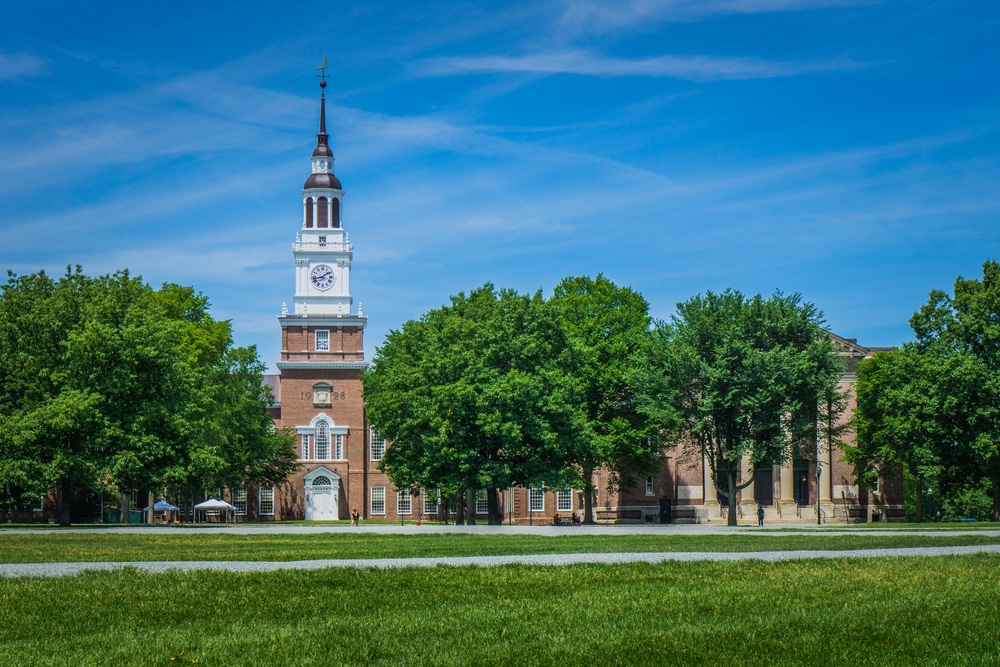Dartmouth vs Northeastern: A Comprehensive Analysis
When deciding on a college or university, there are many factors to consider. From location to academic offerings to campus life, each institution has its own unique qualities that can significantly impact a student’s education and college experience. In this article, we will take a comprehensive look at two well-known universities, Dartmouth vs Northeastern. By examining each school in detail, we hope to provide a thorough comparison that will help prospective students choose the right fit for their needs.
One of the first things that may come to mind when comparing Dartmouth and Northeastern is location. While both universities are located in the Northeastern region of the United States, they are situated in different cities. Dartmouth is located in Hanover, New Hampshire, a small town on the border of Vermont, while Northeastern is located in Boston, Massachusetts, a bustling metropolitan city.
For students who prefer a more traditional college town setting, Dartmouth may be the better option. However, for those who crave the fast-paced city lifestyle, Northeastern’s location provides endless opportunities for internships, cultural experiences, and networking.
Boston is a city rich in history and culture. It is home to numerous museums, including the Museum of Fine Arts and the Isabella Stewart Gardner Museum, as well as historical sites such as the Freedom Trail and the USS Constitution Museum. In addition, Boston is known for its thriving sports scene, with professional teams in baseball, basketball, hockey, and football. Students at Northeastern have the opportunity to immerse themselves in all that Boston has to offer, from attending a Red Sox game at Fenway Park to exploring the city’s diverse neighborhoods.
Academic Programs and Offerings: How They Differ
Both Dartmouth and Northeastern offer a wide range of academic programs and majors. However, there are some key differences between the two universities. Dartmouth is known for its strong liberal arts programs, including English, European Studies, and Philosophy. Northeastern, on the other hand, is known for its emphasis on experiential learning and cooperative education programs in fields such as engineering, business, and healthcare.
Another notable difference is Dartmouth’s focus on undergraduate education. The school does not have any graduate programs, which allows for a more personalized and intimate educational experience. Northeastern, however, offers a variety of graduate programs and is known for its research opportunities.
In addition to their academic programs, both universities offer a variety of extracurricular activities and clubs for students to get involved in. Dartmouth has a strong focus on outdoor activities, with opportunities for hiking, skiing, and other outdoor sports. Northeastern, on the other hand, has a strong emphasis on entrepreneurship and innovation, with resources such as the IDEA Venture Accelerator and the Center for Entrepreneurship Education.
Furthermore, both universities have unique campus cultures. Dartmouth is known for its strong sense of community and traditions, such as the annual Winter Carnival and the Dartmouth Outing Club. Northeastern, on the other hand, has a more urban campus located in the heart of Boston, with easy access to the city’s cultural and professional opportunities.
Admission Standards: Which School is More Competitive?
Both Dartmouth and Northeastern are selective institutions with high admission standards. In 2020, Dartmouth’s acceptance rate was 8.8%, while Northeastern’s was 19%. However, it’s important to note that acceptance rates do not paint the full picture when it comes to admission standards.
Dartmouth places a strong emphasis on standardized test scores and is known for its rigorous academics. Northeastern, on the other hand, takes a more holistic approach to admissions and considers factors such as extracurricular activities and community involvement. Ultimately, both schools are highly competitive, and the admission process will likely be challenging for most applicants.
It’s worth noting that both Dartmouth and Northeastern have been making efforts to increase diversity and inclusivity in their student bodies. Dartmouth has implemented a test-optional policy and has also increased outreach to underrepresented communities. Northeastern has also implemented a test-optional policy and has created programs to support first-generation and low-income students. These efforts demonstrate that both schools are committed to creating a more diverse and inclusive campus environment.
Student Life at Dartmouth and Northeastern: A Closer Look
While academics are undoubtedly important, a student’s overall college experience is defined by more than just their classes. From extracurricular activities to campus traditions, student life plays a significant role in shaping a student’s college experience.
At Dartmouth, the Greek system is a prominent part of campus life, and many students are involved in fraternities and sororities. The school also has a strong outdoor culture, with opportunities for hiking, skiing, and other outdoor activities. Northeastern, on the other hand, has a more urban campus and offers a variety of clubs and organizations for students to get involved in. The school also has a strong focus on community service and social justice initiatives.
Both Dartmouth and Northeastern offer a wide range of resources and support for their students. Dartmouth has a strong emphasis on undergraduate research, with opportunities for students to work alongside faculty members on research projects. Northeastern, on the other hand, has a co-op program that allows students to gain real-world experience in their field of study through internships and work placements. Additionally, both schools have robust career centers that offer career counseling, job search assistance, and networking opportunities for students and alumni.
Faculty and Staff Comparison: Experience, Diversity, and Expertise
The quality of faculty and staff can have a significant impact on a student’s educational experience. Both Dartmouth and Northeastern pride themselves on their experienced, diverse faculty members. However, there are some differences to note.
Dartmouth has a smaller faculty, which allows for more personalized attention from professors. The school also has a strong tradition of emphasizing teaching over research. Northeastern, on the other hand, has a larger faculty and places a greater emphasis on research. Both institutions have faculty members with a range of expertise and diverse backgrounds, providing students with a broad range of perspectives and experiences.
Another important factor to consider when comparing the faculty and staff at Dartmouth and Northeastern is their level of involvement in the community. Dartmouth has a strong commitment to community service and encourages its faculty and staff to engage in outreach programs. This not only benefits the local community but also provides students with opportunities to get involved and make a difference. Northeastern also has a strong focus on community engagement, with many faculty members involved in research projects that address social and environmental issues. This commitment to community involvement is just one more way that both institutions strive to provide a well-rounded educational experience for their students.
Dartmouth vs Northeastern: Research Opportunities
Both schools offer a variety of research opportunities for students. At Dartmouth, research opportunities are primarily focused on undergraduate students, while at Northeastern, research is often conducted across all levels of education, including graduate and doctoral students. Students at both schools can participate in research as early as their freshman year, providing them with valuable hands-on experience and exposure to cutting-edge research in their fields.
At Dartmouth, research opportunities are available in a wide range of fields, including biology, engineering, and social sciences. Students can work with faculty members on ongoing research projects or pursue their own independent research projects. The school also offers funding opportunities for students to conduct research during the summer or academic year.
Similarly, Northeastern offers research opportunities in various fields, such as health sciences, computer science, and business. The university has several research centers and institutes, including the Institute for Health Equity and Social Justice Research and the Global Resilience Institute. Students can also participate in co-op programs, which allow them to gain research experience while working in industry or government settings.
Dartmouth vs Northeastern: Campus Resources
Access to resources and facilities can significantly impact a student’s educational experience. Both Dartmouth and Northeastern have well-equipped libraries and modern laboratory facilities. However, there are some differences to note.
Dartmouth’s libraries are located across four campuses, and the school emphasizes the importance of hands-on research and exploration. Northeastern, on the other hand, has a more centralized library system and is known for its state-of-the-art science and technology facilities.
In addition to libraries and laboratories, both Dartmouth and Northeastern offer a variety of other facilities to enhance the student experience. Dartmouth has a strong focus on outdoor activities and has a variety of recreational facilities, including a skiway, golf course, and boathouse. Northeastern, on the other hand, has a large fitness center and offers a wide range of intramural sports and fitness classes. Both schools also have extensive dining options, with a variety of on-campus restaurants and cafes to choose from.
Dartmouth vs Northeastern: Career Services for Students
Preparing for a career after graduation is a crucial aspect of the college experience. Both Dartmouth and Northeastern offer extensive career development resources for students, including job fairs, one-on-one career counseling, and networking opportunities.
At Dartmouth, the Center for Professional Development helps students with career exploration, job search strategies, and networking opportunities. Northeastern’s co-op program allows students to gain real-world experience and develop professional skills in their fields of study. Ultimately, both schools have robust career services programs to help students prepare for life after graduation.
In addition to these resources, both universities also have strong alumni networks that can provide valuable connections and career advice. Dartmouth’s alumni network spans across the globe and includes successful professionals in a variety of industries. Northeastern’s alumni network is similarly extensive, with graduates working in fields ranging from finance to healthcare to technology. These networks can be a valuable resource for students looking to make connections and find job opportunities after graduation.
Dartmouth vs Northeastern: Alumni Network and Professional Development Opportunities
A strong alumni network can be a valuable resource for students and graduates looking to build their careers. Both Dartmouth and Northeastern have strong alumni networks with active alumni associations across the country.
Dartmouth’s alumni network is particularly strong in the fields of finance, consulting, and law. Northeastern’s alumni network is known for its connections in the technology sector and entrepreneurial endeavors. Both schools offer networking events and opportunities for job shadowing and mentoring, providing students with valuable connections in their desired career fields.
In addition to networking events and job shadowing opportunities, Dartmouth also offers a robust professional development program for its alumni. The Dartmouth Alumni Career Services provides career counseling, resume reviews, and access to job postings exclusively for Dartmouth alumni. This program is particularly helpful for alumni who are looking to make a career change or transition into a new industry.
On the other hand, Northeastern’s alumni network offers a unique opportunity for graduates to participate in the university’s co-op program. This program allows alumni to return to Northeastern as mentors and employers for current students. Alumni can provide valuable guidance and mentorship to students while also gaining access to a pool of talented and motivated individuals for their own businesses or organizations.
Dartmouth vs Northeastern: Sports Programs and Extracurricular Activities
Extracurricular activities, including sports, can be a significant aspect of the college experience. Both Dartmouth and Northeastern offer a variety of sports programs and opportunities for students.
Dartmouth has a strong tradition of athletics and is a Division I member of the NCAA. The school has a wide range of varsity sports teams, as well as club and intramural sports options for all students. Northeastern also has a robust sports program and is a member of the Colonial Athletic Association. However, the school places a greater emphasis on club sports and intramurals, providing opportunities for students to participate in a variety of sports and activities outside of varsity athletics.
In addition to sports programs, both Dartmouth and Northeastern offer a wide range of extracurricular activities for students. Dartmouth has over 200 student organizations, including clubs focused on community service, the arts, and academic interests. Northeastern also has a diverse range of student organizations, with over 300 clubs and organizations available to students.
Furthermore, both schools offer unique opportunities for students to engage in experiential learning through their extracurricular activities. Dartmouth’s Outing Club, for example, provides students with opportunities to explore the outdoors through activities such as hiking, camping, and rock climbing. Northeastern’s co-op program allows students to gain real-world work experience in their field of study, providing a valuable addition to their academic experience.
Cost of Attendance at Dartmouth vs Northeastern
College is a significant financial investment, and the cost of attendance is an important consideration when comparing schools. Both Dartmouth and Northeastern are expensive institutions, with high tuition rates and living expenses.
According to College Board, the annual cost of attendance at Dartmouth for the 2020-2021 academic year was $77,590. Northeastern’s cost of attendance was slightly lower, at $70,428. However, it’s important to note that financial aid and scholarships may be available to offset some of these costs, and students should carefully consider their options for paying for college.
It’s also worth noting that the cost of attendance can vary depending on a student’s individual circumstances. For example, students who live off-campus may be able to save money on housing and meal plans. Additionally, some students may be eligible for in-state tuition rates or other discounts based on their academic achievements or family income. It’s important for students and their families to research all of their options and carefully consider the long-term financial implications of attending a particular college or university.
Dartmouth vs Northeastern: Student Success Rates After Graduation
Ultimately, the goal of attending college is to prepare for a successful career and fulfilling life. Both Dartmouth and Northeastern have strong track records of producing successful graduates.
According to Forbes, Dartmouth is ranked 11th in the nation for producing the highest-earning graduates. Northeastern is also highly regarded for its career-focused education and is known for producing graduates who are well-prepared for the workforce. For students who value career outcomes and success after graduation, both schools are strong choices.
However, success after graduation is not just about earning a high salary. It also includes factors such as job satisfaction, work-life balance, and community involvement. Both Dartmouth and Northeastern prioritize these aspects of success and offer resources to help students achieve them. For example, Dartmouth has a strong alumni network that provides mentorship and career guidance, while Northeastern offers co-op programs that allow students to gain real-world experience and make professional connections. By prioritizing both career success and personal fulfillment, these schools set their graduates up for long-term success in all aspects of their lives.
Dartmouth vs Northeastern: Reputation Comparison
Perception and reputation can significantly impact a student’s job prospects after graduation. Both Dartmouth and Northeastern are highly regarded institutions with strong reputations.
Dartmouth is known for its high standards for academic excellence and rigorous curriculum. The school’s graduates are highly sought after by top employers in a variety of industries. Northeastern, on the other hand, is known for its co-op program and emphasis on hands-on experience, which is highly valued by employers. Ultimately, both institutions have strong reputations and provide opportunities for students to succeed after graduation.
However, there are some differences in the perception of graduates from both schools. According to a recent survey, employers tend to view Dartmouth graduates as more academically prepared and analytical, while Northeastern graduates are seen as more practical and adaptable to real-world situations.
Another factor that sets these two institutions apart is their location. Dartmouth is located in a small town in New Hampshire, which provides a tight-knit community and a focus on outdoor activities. Northeastern, on the other hand, is located in the heart of Boston, which offers students access to a vibrant city and a wide range of cultural experiences.
Prospective Student Guide to Choosing between Dartmouth and Northeastern
Choosing between Dartmouth and Northeastern can be challenging, as both institutions have their own unique qualities and offerings. Ultimately, the decision will be based on individual preferences and priorities.
For students who value a smaller, more intimate campus and a strong focus on undergraduate education and liberal arts, Dartmouth may be the better choice. For those who are interested in experiential learning, cooperative education, and the opportunities provided by a large urban setting, Northeastern may be the better choice.
Regardless of which institution prospective students ultimately choose, they can be assured that they will receive a top-notch education and an unparalleled college experience.
One of the unique qualities of Dartmouth is its strong sense of community. With a student body of just over 4,000, students have the opportunity to form close relationships with their peers and professors. This tight-knit community also extends beyond the classroom, with a variety of student organizations and events that foster a sense of belonging and camaraderie.
On the other hand, Northeastern’s location in the heart of Boston provides students with countless opportunities to engage with the city and its diverse communities. From internships at top companies to volunteering at local non-profits, students at Northeastern have access to a wealth of resources and experiences that can enhance their education and career prospects.
How AdmissionSight Can Help You With College Admissions
AdmissionSight is a college consulting firm that provides personalized assistance to students throughout the college admissions process. Here are some ways that AdmissionSight can help you:
Admissions strategy: AdmissionSight can help you develop a strategic plan for your college application process. Our professional consultants can assist with identifying schools that are a good fit for your academic, extracurricular, and personal goals and help you plan and prioritize your application strategy.
Application review: AdmissionSight can review your application and provide feedback on how to improve it. We can offer suggestions on making your application stand out and highlighting your strengths and unique qualities.
Essay coaching: AdmissionSight can help you craft compelling essays that showcase your personality, goals, and achievements. We can guide you through the essay writing process and provide feedback on your drafts to help you refine your writing.
Interview preparation: AdmissionSight can provide interview coaching to help you feel confident and prepared for college interviews. Our experts can offer tips on how to present yourself professionally and how to answer common interview questions.
Extracurricular planning: AdmissionSight can help you plan and develop your extracurricular activities to make them more impactful and meaningful. We can suggest activities that align with your interests and goals and provide guidance on demonstrating your leadership and initiative.
Overall, AdmissionSight can provide valuable guidance and support throughout the college admissions process to help you maximize your chances of getting accepted into the college of your choice.
With a high success rate of over 75%, we have built a strong network in the past decade. Book an initial consultation today, free of charge!










































